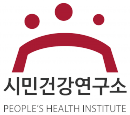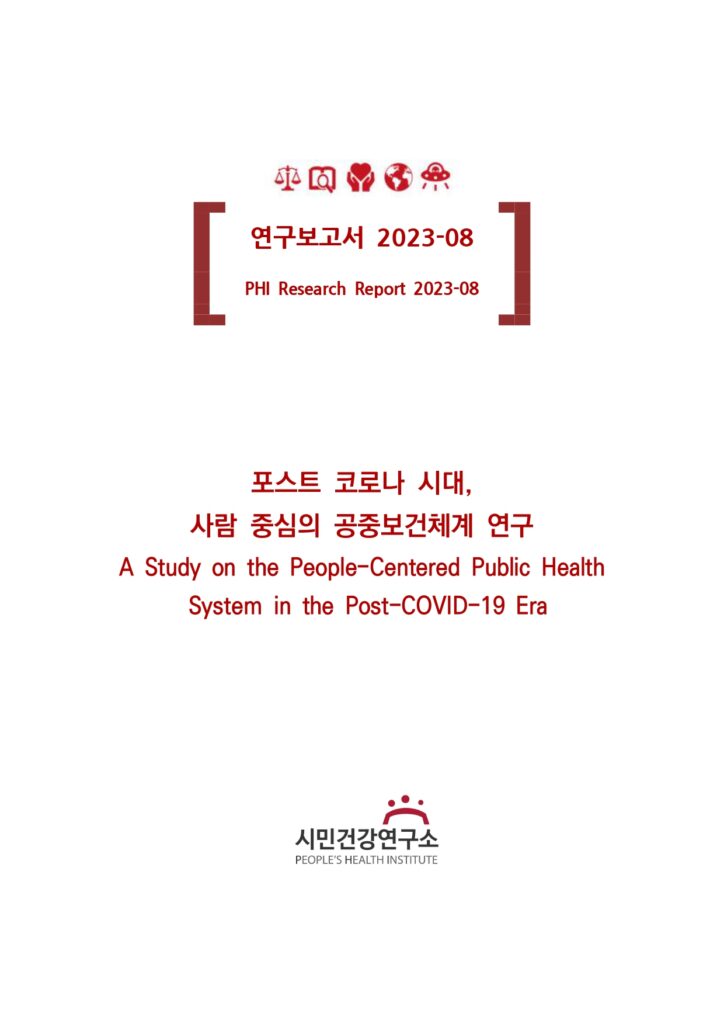전 세계 사람들의 일상을 뒤흔들었던 코로나19가 마침내 서서히 물러가고 있습니다. 지난 5월 세계보건기구는 3년 4개월 만에 코로나19 공중보건위기사태 선포를 해제하였습니다. 한국 정부도 지난 3월 발표한 ‘위기단계 조정 로드맵’에 따라 방역·대응을 단계별로 완화하였고, 8월 31일을 기점으로 코로나19를 인플루엔자와 같은 4급 감염병으로 전환시켰습니다. 향후 수년간 재유행이 반복될 것으로 예상되지만, 이제 비교적 안정적인 앤데믹 국면에 들어선 것으로 보입니다.
포스트 코로나 시대를 맞이한 지금, 우리는 지난 팬데믹 시기를 복기하며 치밀하고 냉정하게 사회 전반에 대해 ‘총체적’으로 평가하는 일이 중요하다고 생각합니다. 그것이 소중한 생명을 황망하게 잃은 동료 시민들의 희생을 헛되지 않게 만드는 길이고, 앞으로 닥쳐올 또 다른 사회적 재난의 위기로부터 우리 자신을 지키는 길이라고 믿습니다. 그러한 일환으로 기획된 이번 연구의 평가 대상은 바로 ‘공중보건체계’입니다.
흔히 공중보건체계라고 하면 감염병 대응을 비롯해 각종 건강 위험으로부터 모든 사람을 안전하게 지키기 위해 존재하는 것으로 생각합니다. 하지만 이번 팬데믹을 통해 또다시 분명하게 드러난 사실은 결코 모든 사람의 건강을 동등하게 보호하지 않는다는 것입니다. 그래서 우리는 ‘코로나 불평등’의 원인을 공중보건체계 그 자체에서 찾아야 한다고 봤습니다. 공중보건체계가 작동하는 원리와 동기 그 자체가 문제라면, 아무리 제도를 수선하고 첨단기술을 개발한다 한들 모두의 평등한 건강권 보장을 담보할 수 없기 때문입니다.
우리는 이 연구에서 코로나 팬데믹의 경험을 토대로 공중보건체계의 은폐된 속성, 특히 국가 통치와 자본의 이해에 편향돼 있는 측면을 드러내고 ‘비판’함으로써 보다 정의롭고 평등한 공중보건체계를 만드는 데 기여하는 것을 목표로 하였습니다. 구체적으로 ‘통치’와 ‘시민주도’, ‘지역분권’, ‘건강불평등’이라는 네 가지 연구 주제를 선정하여 각기 독립적으로 자체 완결적인 연구를 진행하였습니다. 그러다보니 애초 상호정합적인 결과물을 목표하지 않았지만, 연구 내용이 일부 중복되거나 서로 매끄럽게 연결되지 않는 측면이 있을 수 있습니다. 전체 연구를 관통하는 문제의식과 관점을 소개한 ‘1장. 서론’을 먼저 일독한 다음, 순서에 구애받지 않고 자유롭게 관심 있는 주제의 본문부터 읽으시길 바랍니다.
이 연구보고서는 코로나19와 관련해 시민건강연구소가 발간한 세 번째 보고서(<인권 중심 코로나19 시민백서>(2020), <코로나19 백신접종과 시민의 권리>(2021))입니다. 이전 두 보고서들에 담긴 문제의식과 관점을 이어 받으면서도 앞서 말한 연구목표에 맞춰 좀 더 논의의 추상성을 높이고자 하였습니다. 한편 연구보고서 본문의 대부분은 지난해 4~10월 동안 작성되었지만, 재유행 상황 등을 고려해 발간 시기를 늦추게 되었습니다. 이로 인해 최근 발생한 사건이나 제도 변화와 관련된 사실들이 일부 반영되지 못한 부분도 있음을 알려드립니다. 끝으로, 이 보고서에 담긴 다양한 분석과 진단, 주장들 가운데 논리와 근거의 ‘빈 틈’이 발견된다면, 날카로운 비판과 건설적 대안을 아끼지 마시기를 부탁드립니다. 이를 통해 사람 중심의 공중보건체계를 만드는 일에 동참해 주시기 바랍니다.
목차
요약
1. 서론: 코로나 팬데믹을 어떻게 이해할 것인가
2. 통치와 권력 관점에서 공중보건체계 비판
3. 시민주도형 공중보건체계
4. 지역분권형 공중보건체계
5. 공중보건체계와 건강불평등
6. 결론
참고문헌
Abstract
In this study, our aim was to critique the hidden negative aspects of the public health system, drawing from the experience of the COVID-19 pandemic, in order to build a “People-centered public health system” in the post-COVID-19 era. To this end, it is first important to understand the being of the COVID-19 pandemic. In the introduction, we suggested that the COVID-19 pandemic can be defined as “the social” and a multi-dimensional event containing complex and heterogeneous elements, and that it needs to be understood in relation to the framework of the “Neoliberal Regime,” “Risk Society,” and the climate crisis (Anthropocene).
In Chapter 2, we opposed the functionalist approach that overlook the political nature of public health and tried to critically re-examine the public health system from the perspective of Governance and Power. In particular, Foucault’s concepts of biopolitics, biopower, and governmentality were used as theoretical frameworks to uncover the nature of the public health system as a technique of governance. However, the public health system can be understood as a product that is constantly shaped and operated through the interaction of three powers, “state power-economic power-social power,” rather than operating only with the unilateral will of the state. As a result of examining the response to the pandemic, it has been confirmed that the current public health system is under the dominant influence of state power and economic power. However, at the same time, the possibility of change was also found through various cases of resistance movements of social power to intervene in the public health system in order to respond to people’s suffering and needs.
In Chapter 3, we proposed analysis modeling at the level of “Networking,” “Co-production,” and “Governance” to analyze citizen-led participation in enhancing democratic publicness and health equity from a people-centered perspective. As examples of citizen-led public health movements, “the civil movement to expand public health in Western Gyeongnam”, “the movement to demand political agenda of Care”, and “the COVID-19 human rights response network activities” were selected, and the analysis modeling presented above was applied. As a result of the case analysis, the activities of citizens who participated in the co-production venue unexpectedly opened by COVID-19 were not government planning, but urgent, voluntary, and self-rescue efforts, but failed to correct some of the imbalance in existing power relations. Rather, there was an aspect used to strengthen the formal governance that state power was addressing the immediate needs of citizens by monopolizing the agenda.
In Chapter 4, we examined the possibility and alternative principles of a decentralized public health system that enables a higher level of civil participation while avoiding the risks associated with neoliberal decentralization. As a result of analyzing regional COVID-19 response white papers, it was confirmed that the region best understood local field problems that were difficult to solve with state-centered policies and quickly responded when necessary. However, the limitations of the lack of authority of regional governments, the need to establish a mechanism to ensure accountability, and the need to align policy direction between the central and regional governments were also confirmed. Subsequently, through the analysis of the decentralization of the health care system and the COVID-19 response in other countries, the mechanism to be considered for the decentralization of the Korean public health system was derived. We propose an alternative principle of democratic and equal decentralization, not neoliberal decentralization.
In Chapter 5, we tried to find an answer by applying the WPR approach to the question of why the “Social Determinants of Health (SDoH)” couldn’t reduce health inequality. To this end, through the case of collective infection at call centers and the establishment of an essential worker protection system during the COVID-19 period, we examined how knowledge of health inequality problematizes and represents it. As a result of reviewing researches on health inequality, this knowledge conceptualizes the health of call center workers and essential workers as “human capital” or “labor force.” By labeling them as high-risk groups or essential personnel, the researchers paid attention to the sufferings they experience, but did not pay attention to the underlying structural conditions and contexts in which the suffering occurs. Based on this result, we argue that research on health inequality should be reborn as a field that critiques the current system, away from research questions that are aimed at listing inequality phenomena or focus solely on improving microscopic levels.
The task given to us to make a citizen-led, decentralized public health system that solves the problem of health inequality is to develop a “practical” theory on how to strengthen social power in order to change unequal structures, systems, and neoliberal regime.

